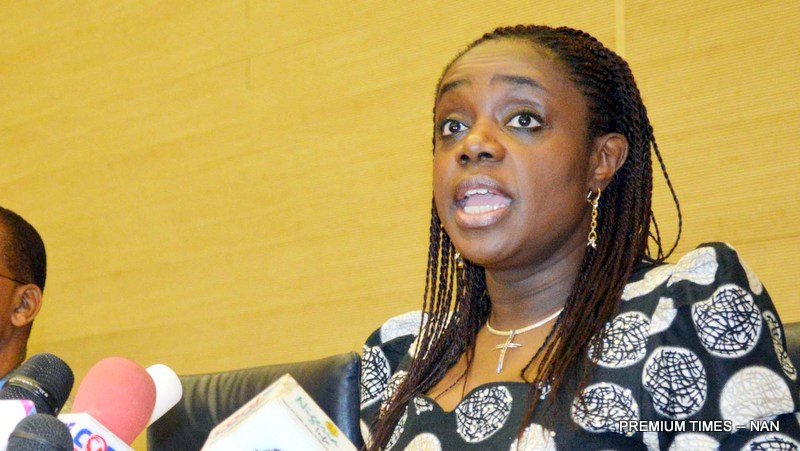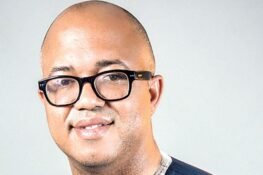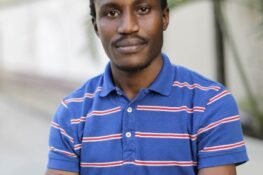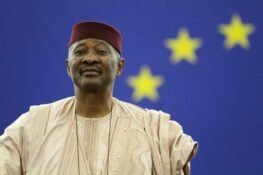The Minister of Finance, Kemi Adeosun, was one of the speakers at the ongoing Wealth Creation Platform organised by the Kingsway International Christian Centre in Lagos. PREMIUM TIMES’ Jayne Augoye had an interview with Mrs. Adeosun on Saturday some minutes into the event where she outlined critical steps the Muhammadu Buhari administration is taking to move Nigeria out of economic recession.
PT: Nigeria is experiencing hard times due to the downturn in oil prices. What step is the Muhammadu Buhari administration taking to move Nigeria out of economic recession?
Adeosun: We are trying to reflate the economy and get it back on the period of growth. And the strategy we are adopting is to inject more money and funds into the economy particularly in the area of capital projects. This is because we believe that in doing this we will do two things in the short term. One is job creation, better roads and bridges, improvement in power supply and more importantly unlock the productivity of the Nigerian economy by creating infrastructure which we know at the moment is missing. The latter is really the reason why Nigerian businesses are not competitive against their foreign counterparts. We believe that if we invest in the right things we will be able to unlock the growth of our economy in the right direction and get us out of our current situation.
PT: In your speech, you mentioned that the government released N750 billion for capital projects. Why then is the impact of these monies still not being felt in the Nigerian economy?
Adeosun: There are a number of reasons why the impact is not as immediate as people would like it to be. One of the reasons is that the projects are all long-term projects and you have to go through a procurement process and this slows us down initially. The second factor is that many contractors have not been paid since 2012. So, when they were given the first tranche, they just sat on it because they didn’t know the second one would come. After we did the second release, which is another N350 billion, we have begun to see a lot of activities. For instance there is so much work going on the Lagos-Ibadan expressway and I am sure you have seen a lot of activities on the highways in the last three months than before. We are planning to do another release before the end of the year because we are very committed to getting this economy moving. We must also follow due process and that is why we have been advertising in the media so Nigerians can get involved in the process. These does slow things down but in the long run it is better for everyone as there is a lot of transparency in what we are doing.
PT: The roads nationwide are in a very deplorable state. What is your ministry doing to ensure that those awarded contracts actually carry out the repairs?
Adeosun: The infrastructure gap in Nigeria is $25 billion a year. We are trying to do two things, which are: getting government money into road constructions and rehabilitation, and secondly we have created a Road Trust Fund. We are going to inter-source private money particularly pension fund money and investment into roads so what you should see in 2017, is a massive focus on roads. So, there will be private monies invested into the roads that can be tolled. If it ordinarily takes you two hours to cover a journey that should take you 20 minutes it means you have already paid a toll in terms of the wear and tear of your car and fuel so why don’t we just quickly do the roads and get people to pay much to use the roads. We are trying to change the philosophy because the gap is too wide and government on its own can’t do it alone. We need to bring private money in and once we do that they need to get their money back. We have also gotten offers from foreign investors as well.
PT: How is the government planning to assist small and medium-sized enterprises (SMEs)?
Adeosun: The SMES account for about 50 per cent of our GDP and that means a majority of Nigerians are working for an employer who employs seven people or less. So, to get the economy to grow, we have to invest in this sector so we are doing a lot. But infrastructure is the biggest challenge we have so we are putting capital into the Development Bank of Nigeria which is a specialist bank set up to channel low cost funds to SMES. It was a project that started about two years ago before it was stalled. We have gotten it up and hope that bank will take up in the early 2017. That bank has 1.3 billion dollars of capital that will be pumped down into SMES through microfinance and commercial banks to the SMES at lower costs. Once the SMES start moving you will begin to see a lot of growth and activity.
PT: Talking about cutting costs in government, can you give us specifics?
Adeosun: We have the Efficiency Unit set up when we came in November and it is working on overheads costs. With regards travels and there are a number of ‘no first class travels’ rules in place. So, ministers and permanent secretaries can only fly business class while others can only fly economy. A revised circular was released this week and it states that Director Generals of government corporations should only fly economy. There are other circulars that show how much can now be spent on food and drinks. We have outlawed the printing of souvenirs, face caps and t-shirts at government events. Yes we do know that the contractors will not be happy but we have to invest in our infrastructure, which is the most critical thing at the moment. We will continue to work on cutting the cost of government. On the salary front we have introduced tighter controls to ensure that everyone that is being paid is a valid worker of the federal government. As such, people that are dead or who have left the service must be removed from the payroll quickly so we can have an efficient payroll. All these are aimed at one thing, which is to ensure we have money infrastructure.
PT: Do you think you have fared well so far?
Adeosun: I am at a place where I can say that if we can stick to what we are doing at the moment, Nigeria can make it. With the oil price so low and we are still able to do so much you can you imagine what much development we will see if we continue on this path. When the oil prices were favourable we had nothing to show for it with the current oil prices, now people can see what we are doing. I am not saying it’s going to be easy but we are on the right path.
PT: What progress is being made ahead of our Eurobond sales?
Adeosun: The Eurobond is in the Bureau of Public Procurement and we are finalizing with the parties involved. So, it is really following due process to get the parties approved and as soon as we get the letters of no objection we will announce whom the parties are.








